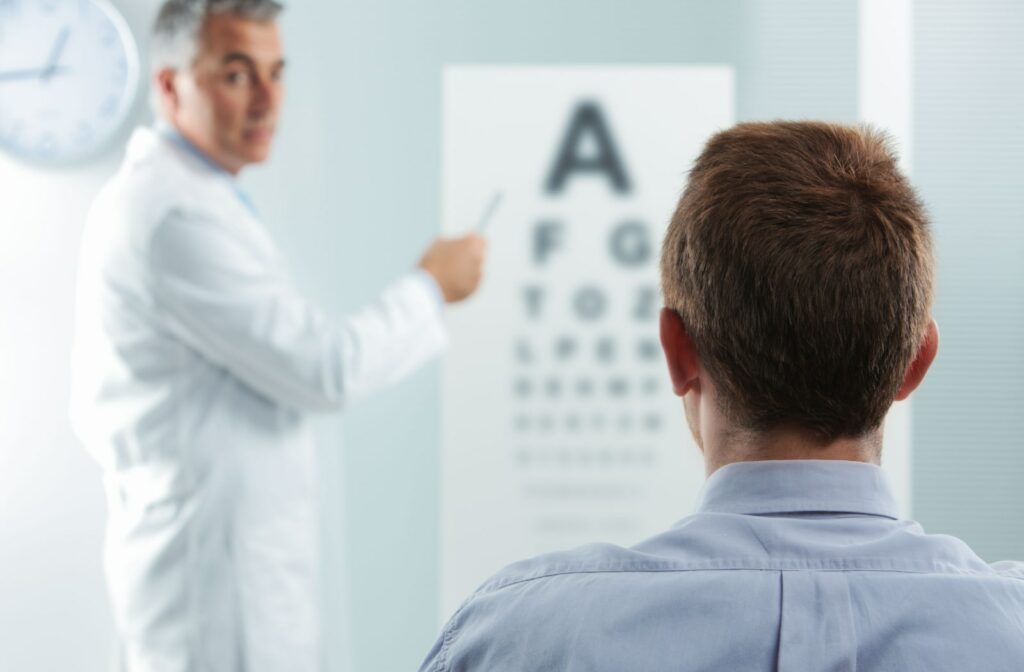As we navigate the world through screens and ever-changing environments, it can affect our vision. Comprehensive eye exams can help maintain your eye health and vision. But what does a comprehensive eye exam entail?
The essence of a comprehensive eye exam goes beyond merely updating your eyeglasses prescription; it’s also about safeguarding your vision by assessing your ocular health and looking for signs of a problem.
The Importance of Comprehensive Eye Exams
Our eyes provide vision clarity, color perception, and depth perception. However, the ability to see can diminish with age or other reasons, such as eye diseases or vision conditions that don’t present with early signs.
Regular comprehensive eye exams are essential for identifying vision-related issues but can uncover serious health problems like diabetes and high blood pressure. So, while you might consider an eye exam an appointment to purchase glasses or contact lenses, it’s a tailored service to support and manage your eye health and vision.
Common vision problems a comprehensive eye exam can detect:
- Presbyopia: Age-related vision condition that affects your ability to focus on close objects.
- Cataracts: Clouding of the natural eye lens that leads to distorted or cloudy vision.
- Diabetic retinopathy: Increased blood sugar levels weaken the tiny blood vessels in the back of the eye, causing vision changes.
- Age-related macular degeneration: Causes degenerative changes to the macular, the part of the eye responsible for central vision.
- Glaucoma: Increased eye pressure causes damage to the optic nerve and has no early symptoms until significant damage has occurred.
Preparing for a Comprehensive Eye Exam
There are some things you can do to prepare for your first comprehensive eye exam appointment. Firstly, note any changes or concerns you may have about your vision. You can do this by jotting down a list of these points to discuss with your eye doctor.
Secondly, you can gather information about your eye health history, medical history, insurance details, and any medications or supplements you take. These snippets of information, when put together, can help your eye doctor form a clear picture of your ocular health and vision needs.

What Happens During a Comprehensive Eye Exam?
Once you’re in the exam room, your eye doctor will discuss the above information. After this, they will conduct standard tests, such as the visual acuity examination, to assess how well you see and the refraction test to see how well your eyes focus light.
The acuity test includes reading letters on a chart, and the refraction test involves looking through different lenses to determine your corrective lens prescription. Both these tests are pivotal for baseline vision measurement and identifying immediate needs.
To delve deeper into your ocular health, your eye doctor will examine the structures inside and outside the eye. The external examination checks for physical abnormalities, while the internal examination looks at the tiny details of the eye for potential early signs of eye diseases.
Additional tests can include a dilated eye exam where drops are used to expand your pupils. Dilation allows your eye doctor to see the back of the eye to understand the state of the retina (the light-sensitive tissue or “screen” at the back of the eye).
The tests conducted in a comprehensive eye exam are not just about diagnosis; they provide insight into your visual processes and can detect abnormalities invisible to the unaided eye. Other tests can include but not limited to a visual field to evaluate your peripheral vision and a binocular vision assessment to check that your eyes work in unison.
Once testing is complete, your eye doctor will discuss the results with you. Based on the findings, they may recommend a vision correction prescription if you have a refractive error and provide guidance on maintaining or improving your eye health.
How Often Do You Need a Comprehensive Eye Exam?
The eyes gradually change as we age and can increase your risk of age-related eye conditions. Some eye conditions and diseases also don’t present with early warning signs to prompt timely management and treatment. For these reasons, adults should have regular eye exams.
According to the American Optometric Association, the frequency of exams is:
- Infants 6 to 12 months old: First eye exam
- Children 3 to 5 years old: Second eye exam
- Children 6 to 17 years old: One before first grade and then annually after that
- Adults 18 to 64: One comprehensive eye exam at least every 2 years
- Adults 65 and older: Yearly comprehensive eye exams
Depending on underlying health conditions, your eye doctor may recommend more frequent partial or comprehensive eye exams.
Preserve Your Vision with Eye Exams
A comprehensive eye exam is not just a routine check-up but an investment in your overall health. By prioritizing regular eye exams and following the recommendations provided by your eye doctor, you take proactive steps toward maintaining clear vision and preventing potential vision loss. If you haven’t had an eye exam in the past year or have concerns about your vision, book an appointment with Precision Eye Care.





